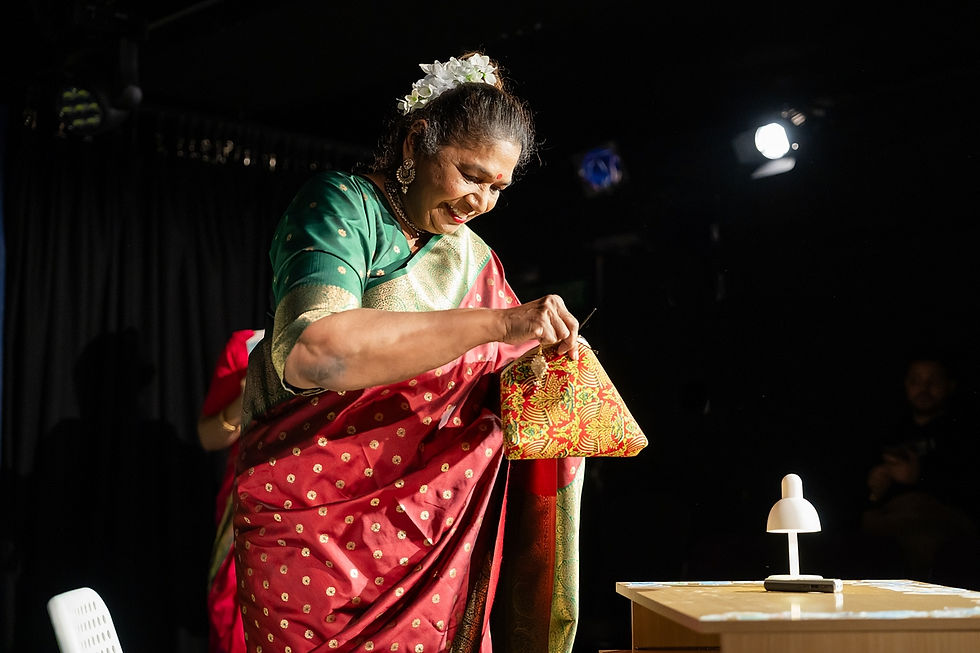Period Parrrty | Soho Theatre
- Cameron Snook (he/him)

- Oct 31, 2025
- 4 min read
The brand new play at Soho Theatres upstairs venue, Period Parrrty, is a modern, exciting premise that promises the audience a look into queerness, heritage and mixing identities.
Gayathiri Kamalakanthan uses their play to bring light to what happens when a non-binary teenager is forced into a Period Party, a Tamil tradition that is really their worst nightmare. The concept itself is exciting and fresh, and you can really feel that in the product you receive. However, with only an hour and a half to tell the story, it feels as if there is so much more of the world left to discover.
This play really could benefit from more time, giving the piece two acts, or even a televised feature could really enrich the story; there are quite a few plot points and important discussions being unpacked that would have even more punch on a wider field.

Despite this, the piece is still searingly honest and powerful with fantastic implements of music and recorded dialogue (thanks to the work of Sound Designer, Niroshini Thambar), bringing an extra dimension to the underground network of queerness and the influence of culture.
The performances from all three cast members are fearless, with everyone managing to display the depths of these characters' wild emotional arcs with honesty and integrity. In such a short amount of time we manage to see all three really take journeys through these worlds and never halt at any emotion, but the true scene-stealer of the piece is the hilarious yet heartbreaking performance from Rani Moorthy as Brintha, Krish’s mother.
Moorthy has an excellent subtle humor that leaves the audience supporting a character which could easily be disliked for the first half of the story, where Brintha is depicted as a barrier to Krish’s capability of authentically displaying their true identity. Yet, as the play unfolds so does Brintha's vulnerability, in discussion around the aftermath of genocide. This has to be one of the most striking moments of the piece; due to Moorthy’s heartbreaking performance and Kamalakanthan’s powerful writing. Moorthy has an incredible journey through the character arc of acceptance and opening up, which certainly provides the play with its emotional punch and overall message.

Tanvi Virmani’s performance as Brenavee feels nuanced and real, with reactions and thoughts presented clearly and effortlessly. Virmani is able to really connect with all the other actors and the audience in a beautiful way that creates a strong narrative for her character and her journey through queerness. When we see her support for Krish blossom into love, it is a truly beautiful moment in the show which still bursts at the seams full of comedy, entertainment and heart.
Krish, the main protagonist, is a hefty role to take on and Elizabeth Green certainly rises to the challenge, building a strong rapport with the audience through their fourth wall breaking and brutal honesty. Green certainly encapsulates the inquisitive, stubborn and daring nature of Krish creating a really exciting performance. Their dysphoric breakdown halfway through the piece is an utter highlight of the show, displaying raw and powerful emotion through physicality and movement (curated beautifully by movement director Sundeep Saini), leaving a strong mark on the audience.
However, with the space being so intimate it unfortunately gives the actors the challenge of balancing over the top action with a naturalistic take and this is something that Green seems to halt at in some moments. Smaller audience sizes means that these few discrepancies are much easier to notice in the small times they did come around. Whilst Green does deliver a powerful performance, the constraints of the space means that all hiccups are on show and it feels as if they were halted by this in some moments.

The space itself is used incredibly well, with a simple yet clever set design from Katie Scott, allowing the performers to physically build the world of these characters and display to the audience their growing queerness. The incorporation of Tamil language cards right at the end of the show feels powerful and signifies the connection of heritage and queerness, with powerful messages being shared on the deterioration that colonisation has on queerness and acceptance.
Whilst the space is certainly utilised and fits the show appropriately, the intimacy makes the moments where the pace and rhythm between the actors fell more prominent, breaking up consistency and being the pieces biggest let down. This could be seen in moments that are meant to have a powerful, awkward silence that just feel awkward due to too much action happening too fast. The directive vision from Gitika Buttoo is certainly something that has powerful roots and emotion; however these teething issues in the space come across jarring and the flow certainly needs some further revision and polish to successfully translate Buttoo’s approach to the piece.
Despite these moments that fall flat, the piece as a whole shows such an important message that truly has high potential to educate and impact a wider audience - opening eyes to fresh and important perspectives of queerness and heritage. There is still development to be desired within this piece but once it has found this progression it shows true potential to be
the next landmark of queer theatre.
Perrriod Party plays at the Soho Theatre until 22nd November 2025.
★★★☆☆ (3*)
Gifted tickets in return for an honest review | Photography by Ikin Yum







Comments